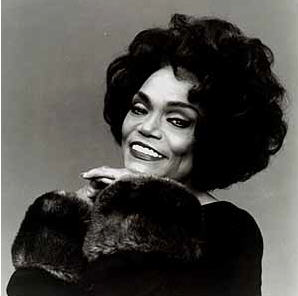Eartha Kitt
I didn't know who Eartha Kitt was until a couple of weeks ago. Many people know her as the actress who played Catwoman in the 1967 season of the Batman and Robin television show. Only after I had read Pat McClendon's article, discussed below, did I look Kitt up in the omnipotent imdb, and discover that she was none other than the mysterious Madame Zeroni, from the 2003 film Holes.
I found a paper about Eartha Kitt posted online by Pat McClendon, who wrote her essay as a diagnosis exercise for her coursework in clinical social work. McClendon reviews Earth Kitt's autobiographical book, "Confessions of a Sex Kitten" after her curiosity is aroused by seeing Kitt interviewed on television. She writes:
In the television interview, [Kitt] spoke of being abused as a child and if I recall correctly her voice changed to that of a small child at one point in the conversation. As the interviewer asked her questions, it was evident to me that she was listening to an internal dialogue before answering some of his questions. I told a friend who was watching the program with me that Eartha Kitt is a multiple (that she has MPD, multiple personality disorder or some variant of MPD). "Watch her dissociate, look at her having a conversation with herself, and listen to the changes in her voice", I told my friend. After the interview was over my friend said, "You could be right. I saw what you were talking about." Now, I really wanted to know her better.
McClendon proceeds to mine Kitt's book for evidence that the actress is actually a "high-functioning individual who has used her dissociative skills creatively". Apparently, people with a dissociative disorder can sometimes experience episodes of "depersonalization" -- i.e., they are unaware that they or their body has done some act, such as driving a car home from a party. It is as if they are a part-time tenant in their own body, checking in at intervals to see what has been happening in their absence. McClendon also explains that people with MPD often have little sense of time:
Eartha Kitt lacks of any sense of time. One of the men who admired her brought her a watch because he noticed that she didn't wear one (p.208). For some people with dissociative disorder, a watch makes them more aware that they are "losing time" and this increases their anxiety about what happened in the meantime. A logical way to reduce this anxiety is to not wear a watch. For other people with dissociative disorders, time has no significant meaning to them because of time distortions. Of course, the other extreme is possible too. Some people with dissociative disorders wear watches that tell them the date, the day of the week, and whether it is a.m. or p.m. because not knowing this information might expose their multiplicity.
Kitt experienced a truely ghastly childhood, which makes her subsequent persistance and courage more remarkable: in 1968 she was invited to a White House luncheon, at which she confronted Lady Bird Johnson about the immorality of the Vietnam War, driving the First Lady to tears. Lyndon Johnson retaliated by blacklisting Kitt, preventing her from finding work in the United States for years. 


4 Comments:
What a magnificent return to the blog, Mister Harris. Jennifer loves Eartha Kitt, and one of her songs was on the soundtrack of our wedding reception.
Hi Bill, glad you two liked it. I still have not heard any Eartha Kitt music, at least knowing that it was her I was hearing.
Collinduncan has a terrific Eartha Kitt song in his mp3 collection ("I wanna be evil") - I'll see if I can get him to post it on his site. This is fascinating stuff on EK, Justin. I'm very interested in 'multiples'.
- Ginger
Thanks, Ginger - I'd love to hear that song. So far, I have heard no Eartha Kitt music whatsoever.
Post a Comment
<< Home